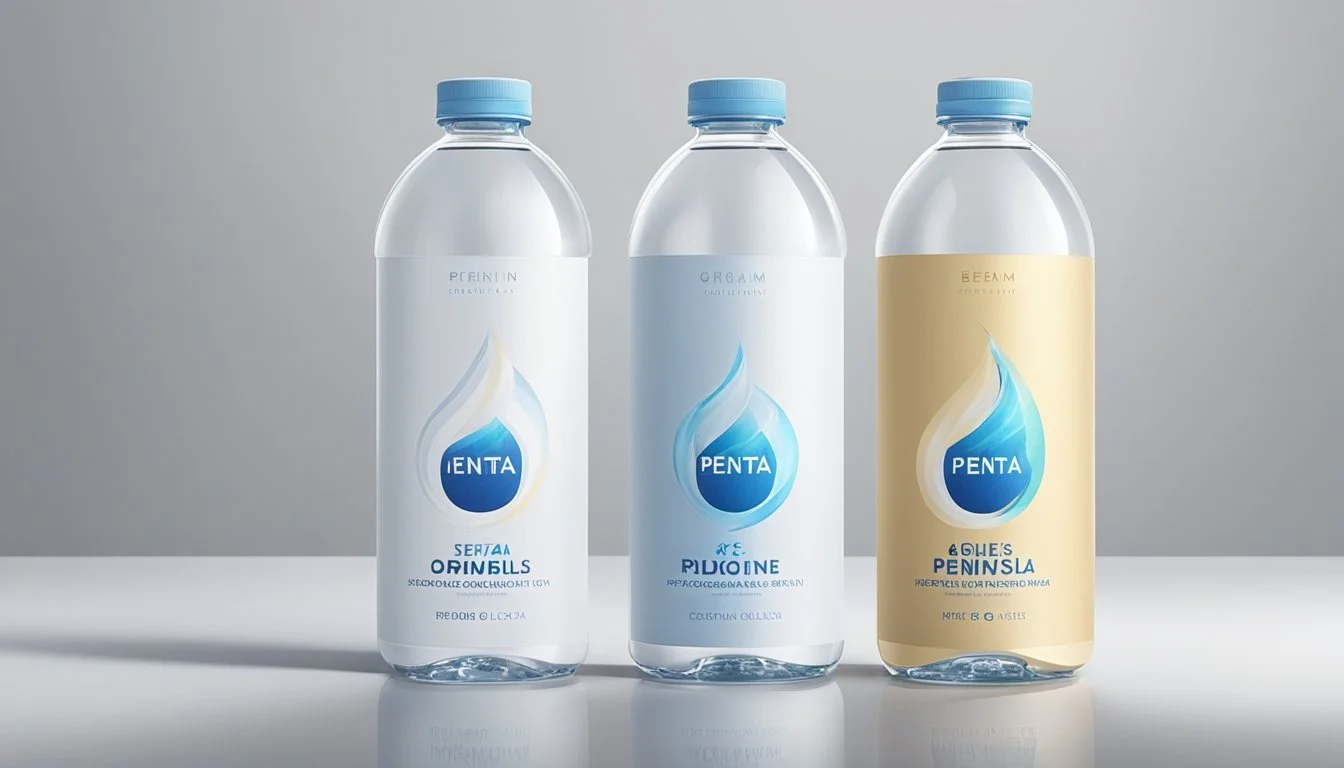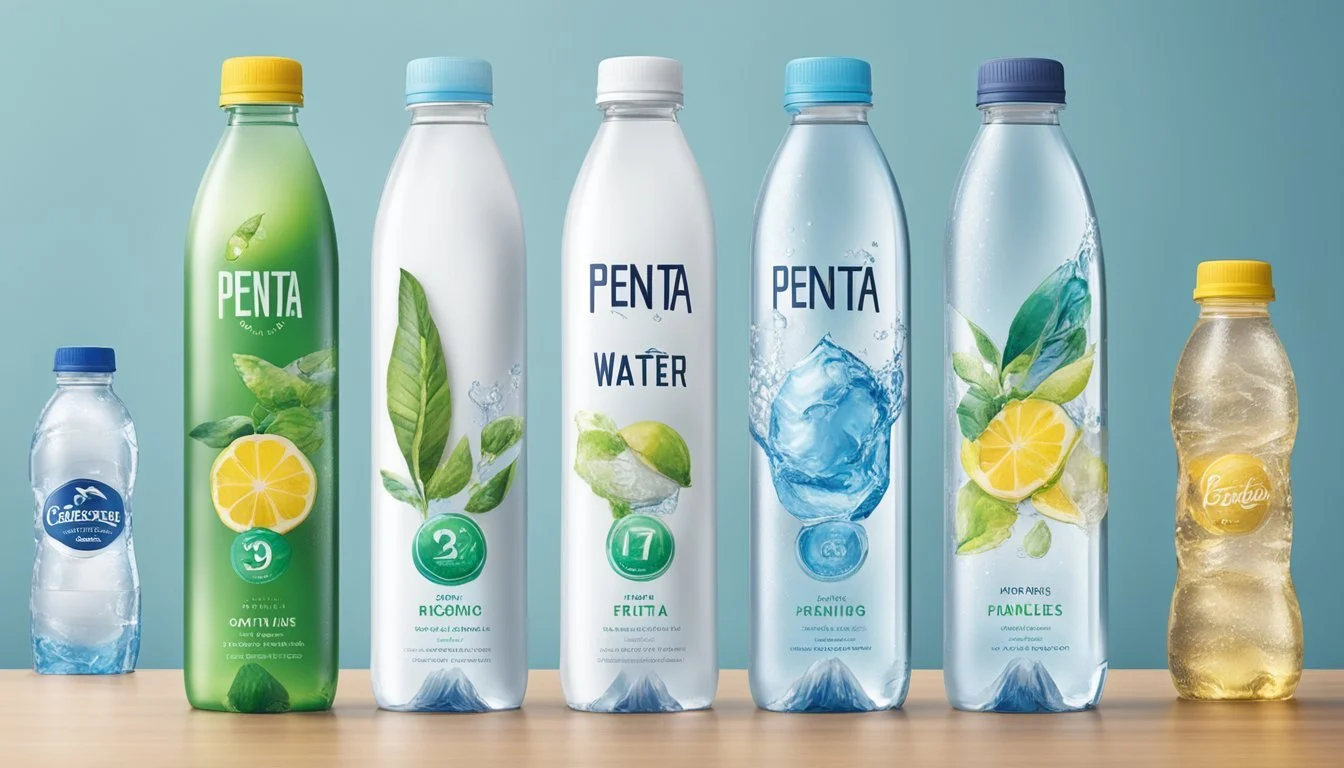Penta vs. Origin
Bottled Water Comparison Guide
Bottled water has become a staple for many, but with so many brands available, making a choice can be daunting. Two popular options that are often compared are Penta and Origin. Penta, known for its scientifically advanced purification process, promises a level of purity that's hard to beat.
On the other hand, Origin emphasizes its natural sources, capturing pristine waters with minimal human intervention. While both brands offer something unique, understanding their key differences can help consumers decide which is the better choice for their hydration needs.
This post will present a detailed comparison, examining factors like purity, taste, and sourcing methods, to determine whether Penta or Origin truly reigns supreme in the bottled water market.
History and Overview of Bottled Water
Bottled water has a rich history that traces back centuries to when water was first bottled for medicinal use. Over the years, various brands have emerged and have become key players in the market, influencing consumer preferences and trends.
Emergence of Bottled Water Brands
Water bottling began in the United Kingdom with the Holy Well plant in 1622. Early bottled water was often sold for its supposed healing properties.
Evian, established in 1826, capitalized on this trend, becoming one of the earliest prominent brands.
By 1845, Poland Spring entered the market, reinforcing the commercial potential of bottled spring water.
These brands laid the foundation for the modern bottled water industry, leading to the rise of global brands like Dasani, Aquafina, Fiji, and Nestlé in the 20th century.
Bottled Water in the Market
Today, the bottled water market is diverse and highly competitive. Leading brands such as Voss, Smartwater, and Icelandic Glacial emphasize purity and premium quality.
Lifewtr and Just Water focus on sustainability and eco-friendly practices.
The market dynamics are driven by branding, water sources, and consumer preferences for taste and quality.
Spring water, mineral water, and purified water cater to different segments, reflecting varied consumer choices in bottled water.
Understanding Water Sources
Both Penta and Origin bottled water brands highlight unique aspects of their sources. This section examines differences between natural spring water and purified water, along with the protection and sustainability of their sources.
Natural Spring Water Vs. Purified Water
Natural spring water comes from underground sources, often filtered through mountain springs, capturing essential minerals along the way. This type of water, like that from Poland Spring, is bottled directly at the source, preserving its mineral composition and natural taste.
Purified water, such as Penta, undergoes extensive filtration, typically using methods like reverse osmosis and ozonation. This process removes contaminants, including microplastics, ensuring the water's purity but often stripping away natural minerals. The primary advantage is the guaranteed purity and consistency in quality, as municipal water sources are rigorously processed.
Protection and Sustainability of Water Sources
Sustainability is a growing concern in the bottled water industry. Brands like Boxed Water focus on using environmentally friendly packaging, while Penta’s plastic bottles are BPA-free. Sourcing practices also impact sustainability. Natural spring water sourced responsibly ensures minimal environmental impact and maintains the natural ecosystem balance.
Purified water is sourced from municipal systems, which are regularly inspected for quality. This method can be more sustainable, as it utilizes existing water supplies without over-extracting natural sources. Protecting these sources from pollution and overuse is essential for both environmental health and consumer safety. Strategies include conservation efforts and advanced filtration techniques to maintain water quality.
Chemistry and Health Implications of Water
Understanding the chemistry of bottled water and its health implications is crucial for informed decision-making. This section looks at the importance of pH levels, the role of minerals, and potential contaminants.
pH Levels and Alkalinity
Penta water is known for its high pH level, which contributes to its alkalinity. The higher pH can help neutralize acid in the body, promoting a balanced pH environment. Alkaline water may potentially aid in better hydration and neutralizing acidity in the stomach.
In contrast, most bottled waters have a neutral pH, around 7. The Food and Drug Administration (FDA) regulates bottled water, ensuring it meets safety standards. Alkalinity in water can also impact taste, making it a preference for some consumers.
Mineral Content and Health Benefits
Minerals such as calcium, magnesium, and potassium are essential for various bodily functions. Penta water is ultra-purified, which can result in fewer naturally occurring minerals. This might mean fewer health benefits related to mineral intake.
Origin water, like many spring waters, typically contains natural minerals. Calcium supports bone health, while magnesium plays a role in muscle function. Potassium is crucial for cardiovascular health. The mineral composition can impact both taste and health benefits, making it an important consideration.
Safety Concerns: Contaminants and Regulations
Safety concerns include potential contaminants like lead and heavy metals. The FDA sets stringent regulations to ensure bottled water safety. Despite this, studies have found microplastics and other tiny contaminants in bottled water, raising safety questions.
Microplastics and other contaminants can originate from the plastic bottling process. Additionally, some bottled waters may contain fluoride or trace heavy metals, though these are generally within regulated safe limits. Regular testing and compliance with FDA standards help mitigate these risks, but awareness remains key for consumers.
Understanding these factors allows consumers to make informed choices about the bottled water they consume regarding health and safety.
Manufacturing Processes and Purity
Penta and Origin approach water purification with distinct methods and technologies, each ensuring a high level of purity for consumers. This section explores their filtration techniques, purity standards, and unique processes.
Filtration Techniques and Purity Standards
Penta emphasizes an extensive filtration process designed to eliminate contaminants, additives, and impurities. Their 13-step purification process includes multiple stages such as reverse osmosis and ultraviolet light treatment. This results in water that is exceptionally pure and often described as having a clean, crisp taste.
Origin, on the other hand, utilizes a combination of traditional filtration and modern techniques. They typically incorporate reverse osmosis and distillation to ensure they remove impurities. The purified water undergoes tests to verify it meets stringent purity standards, making it a reliable choice for those concerned about water quality.
Distinct Purifying Technologies of Penta and Origin
Penta uses a unique patented process known as Hydro-7, which focuses on high-efficiency filtration. This technology ensures that the water is purified at a molecular level, removing up to 99.9% of contaminants. The brand prides itself on the fact that their water contains no detectable levels of impurities such as heavy metals or microorganisms.
Origin also emphasizes purity but with a focus on combining time-tested methods with new advancements. Their distilled water process efficiently removes harmful substances, while the reverse osmosis system further polishes the water quality. In some versions, traces of oxygen are added post-purification to enhance taste and provide slight health benefits.
Both brands employ rigorous testing and quality control procedures to maintain their high purity standards, ensuring they deliver clean, safe, and refreshing bottled water to consumers.
Bottling and Packaging Innovations
The bottled water market continually seeks innovations to improve sustainability and water quality. Key areas include the use of eco-friendly materials and designs, and understanding how packaging impacts water taste.
Eco-Friendly Materials and Designs
Penta uses BPA-free plastic bottles which ensure consumer safety and product purity. BPA, or bisphenol A, is a chemical in some plastics that can leach into beverages and pose health risks. Therefore, eliminating BPA is crucial.
Origin Water, in contrast, is increasingly adopting glass bottles. Glass is 100% recyclable and free of harmful chemicals, making it an environmentally friendly choice.
In efforts to promote sustainability, Origin Water explores boxed water options. These cartons are primarily made from renewable resources, reducing the carbon footprint. Such thoughtful packaging meets growing consumer demands for eco-friendly products.
The Impact of Packaging on Water Taste
The material of the bottle can influence the taste of the water. Plastic bottles, even if BPA-free like those used by Penta, sometimes impart a faint plastic taste, particularly when exposed to heat.
Glass bottles used by Origin Water maintain the water's pure taste, free from any leaching chemicals. Glass is inert and does not interact with the water, ensuring a pristine taste.
Packaging innovations aim not just at environmental benefits but at preserving the integrity of the water’s flavor. Consumers looking for pure taste often prefer glass over plastic for this reason.
Comparative Analysis: Penta vs. Origin
Penta and Origin bottled waters offer distinct features that make them unique in terms of taste, hydration efficiency, and consumer value. This section provides an in-depth comparison to help you make an informed decision.
Taste and Texture
Penta water is known for its clean and crisp taste, attributed to its advanced purification process. This process removes impurities, resulting in a remarkably smooth texture.
Origin water, sourced from natural springs, has a more natural and slightly minerally taste. Its texture remains refreshing and light, appealing to those who prefer a subtler flavor. The difference in taste and texture between the two brands can be partially attributed to their different sources and filtration methods.
Health and Hydration Efficiency
Penta water has a slightly alkaline pH level, which can contribute to maintaining the body's natural pH balance and promote better hydration. Its meticulous purification process ensures the removal of contaminants, making it a popular choice for health-conscious consumers.
Origin, with its natural spring source, retains valuable minerals that can enhance hydration and overall health. These minerals, while subtle, can offer additional benefits like improved energy levels and better electrolyte balance. Both brands are effective for hydration, but the choice may hinge on individual health preferences.
Price Point and Consumer Value
Penta is often positioned as a premium brand, reflected in its higher price point due to its rigorous purification process and health benefits. It appeals to consumers willing to invest in high-quality water.
Origin, while also a premium brand, is generally more cost-effective compared to Penta. It offers good consumer value by providing natural spring water at a moderately lower price. For budget-conscious consumers, Origin presents an attractive option without compromising on quality. The decision between the two will depend on personal preferences and budget constraints.
Environmental Impact and Social Responsibility
Penta and Origin bottled waters differ significantly in their approaches to environmental impact and social responsibility. This stems from their sourcing methods and their respective commitments to sustainability practices and eco-friendly initiatives.
Water Sourcing and Ethical Considerations
Water sourcing is a critical factor in assessing the environmental impact of bottled waters. Penta sources its water from natural aquifers. The company claims rigorous purification processes that ensure high water quality. However, details on the ethical considerations or the environmental impact of this sourcing are less transparent.
Origin, on the other hand, emphasizes the ethical aspects of its sourcing practices. The company prioritizes sustainable sourcing methods that minimize environmental disruption. They aim to work in harmony with natural regenerative cycles, ensuring that water extraction does not deplete local resources. This mindful approach positions Origin as a more ethically-driven brand regarding water sourcing.
Brand Commitments to Environmental Sustainability
Penta’s environmental sustainability commitments focus on the use of BPA-free plastic for their bottles. While this is a step towards consumer safety, the broader environmental impact of plastic use remains a concern. Penta’s efforts in large-scale sustainability initiatives are not prominently advertised, which may leave eco-conscious consumers wanting more transparency.
In contrast, Origin shows a robust commitment to environmental sustainability. The company utilizes eco-friendly packaging materials, such as biodegradable and recyclable options. Origin also actively engages in community-level environmental projects and partnerships with ethical organizations. Their visible and measurable impacts in environmental sustainability efforts highlight a strong commitment to reducing their ecological footprint.
In summary, Origin sets itself apart with its sustainable sourcing and comprehensive environmental initiatives, while Penta focuses primarily on water purity and safe packaging.
Consumer Insights and Preferences
Understanding consumer preferences and trends helps clarify what makes Penta and Origin distinct choices among bottled water options. This section examines market dynamics and consumer feedback to provide a clearer picture of how each brand stands in public opinion.
Market Trends and Water Consumption Habits
The bottled water market has been expanding rapidly, driven by increasing health consciousness and convenience factors. Consumers often differentiate between purified water, like Penta, which is recognized for its ultra-purified process, and spring water, such as Origin, which many choose for its natural source.
Many consumers are shifting from tap water to bottled water due to concerns about contaminants. Popular brands capitalize on this trend by emphasizing their purification processes or natural sources. This trend has led to a surge in demand for premium water brands that promise higher quality and better taste.
Comparing Consumer Reviews and Feedback
Consumer reviews play a vital role in shaping public opinion about bottled water brands. Penta water is often praised for its clean, crisp taste, likely a result of its rigorous purification process. Customers who prefer ultra-purified water tend to favor Penta over other brands.
In contrast, Origin water, sourced from natural springs, attracts those who prefer a more 'natural' taste. Reviews highlight its refreshing quality, although availability can sometimes be an issue. Comparing these feedbacks, Penta appeals more to those prioritizing purity, while Origin attracts those who value natural sourcing.
Such insights illustrate how consumer preferences are split between the perceived benefits of ultra-purification and natural spring sources, guiding their purchase decisions accordingly.
More About Penta
Mountain Valley Spring Water vs Penta: Which Bottled Water is Better?
Penta vs Richard's Rainwater: Which Bottled Water is Better?
Penta vs Whole Foods Italian Still Mineral water: Which Bottled Water is Better?







